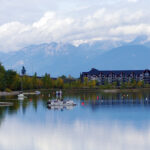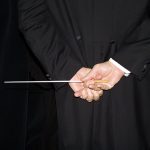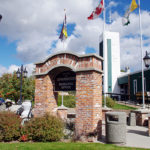Home »

Death At La Fenice an accomplished novel
Book Review
By Derryll White
Leon, Donna (1992). Death At La Fenice.
“Ah, sir, I’m guilty to death
And all I ask is death;
Too late I see my sin;
With your sword pierce this breast
Which merits no pity.”
The Venice Board of Trade and Visitor’s Bureau should really put her on retainer. Born in New Jersey, Donna Leon has lived and worked in Venice, Italy for more than 25 years, and has clearly taken it to her heart. She consistently presents the city in an alluring and magical manner, a city that her readers world-wide lust to visit. This is Leon’s first mystery and she immediately declares herself a princess of place and an owner of insights tour guides would kill for. Published almost 24 years ago, this book is still available and I suggest you have Lotus Books order it and begin your exploration of Donna Leon from the beginning.
 This volume introduces Guido Brunetti, intelligent and resourceful vice-commissario of the Venice police. He is educated, well-read, soulful and perceptive. Brunetti makes a point of needing to separate the public knowledge of the well-known, murdered conductor Maestro Wellauer from the private, dark man that he was. Therein, Brunetti feels, is the beginning of recognition that will lead to the murderer. It is a fine point, but not one that a lot of writers make. Brunetti broods on the pressures imposed on the police by a wide range of newspapers all demanding resolution of the murder ‘for the honour of Venice.’ After all, the opera must not be defiled.
This volume introduces Guido Brunetti, intelligent and resourceful vice-commissario of the Venice police. He is educated, well-read, soulful and perceptive. Brunetti makes a point of needing to separate the public knowledge of the well-known, murdered conductor Maestro Wellauer from the private, dark man that he was. Therein, Brunetti feels, is the beginning of recognition that will lead to the murderer. It is a fine point, but not one that a lot of writers make. Brunetti broods on the pressures imposed on the police by a wide range of newspapers all demanding resolution of the murder ‘for the honour of Venice.’ After all, the opera must not be defiled.
Donna Leon gives the reader a clear sense of the social differences Venice has to North America. Life is slower, with more time regularly devoted to lunch and coffee (what a sane populace). The bureaucracy is exceedingly complex and sometimes negotiated with bribes as standard behaviour. The cemeteries are a premium space with many citizens being disinterred to make room for new corpses, and their bones placed in an ossuary within the cemetery’s walls. Fascinating facts in the midst of a murder investigation.
The author is a very clear, strong writer. I admit I did falter when she stated that Signorina Lynch’s name was made of five consonants. But by the same measure most writers do not even think of such details. Something I think Donna Leon does very well, and which I enjoyed no end, in paying attention to the niceties of social class. It is not something we consider much in North America, presuming as we do a total abdication of class structure. Nothing of course could be further from the truth, and Leon puts it in our face by clearly recognizing the differences wealth and prestige create in European society. And at the same time she pushes characters like Brunetti and Doctor Barbara to struggle with concepts of law and compassion and gender difference.
In the end, the novel focuses on human evil, on the inability of a man to curb his basest desires. I appreciate the way Leon catches the innate difference of the female mind and passion. Both in anger, desire, action and thought her heroines – and there are several here – act so much more directly and in tune with themselves than do men. This is a very accomplished novel for an author’s first publication. I enjoyed it very much and will continue to read Donna Leon.
****
Excerpts from the novel:
VENICE – But these were the hours when, for Brunetti, the city became most beautiful, just as they were the same hours when he, Venetian to the bone, could sense some of her past glory. The darkness of the night hid the moss that crept up the steps of the palazzo lining the Grand Canal, obscured the cracks in the walls of churches, and covered the patches of plaster missing from the facades of public buildings. Like many women of a certain age, the city needed the help of deceptive light to recapture her vanished beauty.
POLLUTION – As the number 8 boat slapped its way across the choppy waters, he stood on the deck and looked off in the distance at the industrial inferno of Maghera, where smokestacks tossed up fluffy clouds of smoke that would gradually sneak across the laguna and had already destroyed millions of the crabs that had crawled through the nightmares of his childhood. What Redeemer could come and save the city from the pall of greenish smoke that was slowly turning marble to meringue? A man of limited faith, he could imagine no salvation, either divine or human.
THE PRESS – Not for the first time in his career, Brunetti reflected upon the possible advantage of censorship of the press. In the past, the German people had got along very well with a government that demanded it, and the American government seemed to fare similarly well with a population that wanted it.
VENETIAN WAYS – The walls had been stripped of paint and plaster and taken down to the original brick. The most remarkable thing in the room was the tremendous brightness that glared from the uncovered skylights, six of them, set in triple pairs on either side of the peaked ceiling. Whoever had received permission to alter the external structure of a building this old, Brunetti reflected, either had powerful friends or had blackmailed both the mayor and the city planner.
VENICE – It seemed to him that all the shops that served the native population – pharmacies, shoemakers, groceries – were slowly and inexorably disappearing, replaced by slick boutiques and souvenir shops that catered to the tourists, filled with luminescent plastic gondolas from Taiwan and papier-mâché masks from Hong Kong. It was the desire of the transients, not the needs of the residents, that the city’s merchants answered. He wondered how long it would take before the entire city became a sort of living museum, a place fit only for visiting and not for inhabiting.
 – Derryll White once wrote books but now chooses to read and write about them. When not reading he writes history for the web at www.basininstitute.org.
– Derryll White once wrote books but now chooses to read and write about them. When not reading he writes history for the web at www.basininstitute.org.







